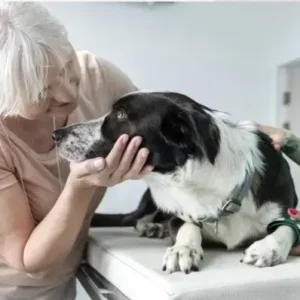What is Hyperthyroidism in Dogs?
Hyperthyroidism in dogs occurs when the thyroid glands, located in the neck, produce too much thyroid hormone. This hormone helps regulate metabolism, but when overproduced, it can lead to weight loss, excessive thirst, and other symptoms. While hyperthyroidism is common in humans, it is much less common in dogs, with hypothyroidism being the more frequently diagnosed thyroid disorder.
Causes of Hyperthyroidism in Dogs
The primary cause of hyperthyroidism in dogs is typically benign tumors, known as adenomas, that develop on the thyroid glands. These tumors increase the production of thyroid hormone, leading to the symptoms of hyperthyroidism.
Other common causes of hyperthyroidism include:
- Genetics: Certain dog breeds, like Boxer and Beagle, Golden Retriever, and Siberian Husky. are more predisposed to developing hyperthyroidism.
- Tumors: Rare malignant tumors can also lead to hyperthyroidism.
- Thyroid Gland Overstimulation: In some cases, the thyroid glands can be overstimulated due to underlying conditions.
Symptoms of Hyperthyroidism in Dogs
Recognizing the symptoms of hyperthyroidism is essential for early diagnosis and treatment. Common signs include:
- Weight loss despite increased appetite: Your dog may seem hungrier than usual, but still lose weight.
- Hyperactivity and restlessness: Dogs with hyperthyroidism may become unusually active and find it hard to calm down.
- Increased thirst and urination: This is a key indicator that the thyroid may be overactive.
- Coat changes: You may notice thinning or hair loss, particularly around the back.
- Other symptoms: Vomiting, diarrhea, and irregular heart rate may also occur.
How is Hyperthyroidism Diagnosed in Dogs?
There are several treatment options available for managing hyperthyroidism in dogs, depending on the severity of the condition:
- Surgery: If a thyroid tumor is detected and not attached to surrounding tissue, a thyroidectomy (tumor removal) is recommended. For tumors under the tongue or at the heart base, surgery can also be performed. If surgery is delayed, methimazole may be prescribed to manage thyroid levels until the procedure.
- Radiation Therapy: Used for metastatic thyroid carcinoma or when surgery to remove a tumor is too risky due to the tumor’s size or location. This treatment can also be effective when radioactive iodine therapy is performed to target thyroid cancerous cells.
- High-Dose Radioactive Iodine (I-131) Therapy: This treatment is highly effective for thyroid carcinoma that cannot be surgically removed or has spread. It’s also used to treat residual cancer cells after a thyroidectomy.
- Chemotherapy: Drugs like toceranib phosphate (Palladia), doxorubicin, and cisplatin are used for hyperthyroidism caused by thyroid carcinoma.
- Diet Change or Discontinuing Seaweed/Kelp Supplements: For dogs with hyperthyroidism caused by consuming thyroid tissue in raw meat diets or seaweed/kelp supplements, eliminating these sources is the best treatment.
- Adjusting Thyroid Supplement Dose: Dogs on thyroid medication for hypothyroidism may need a dose adjustment if they develop hyperthyroidism symptoms.
- Palliative Care for Cancerous Tumors: If surgery, chemotherapy, or radiation are not options, Methimazole medication and Hill’s y/d diet can help manage hyperthyroidism symptoms. This palliative care does not address the tumor, allowing it to continue growing or spreading.
- Additional testing: In some cases, a T3 suppression test may be used to help diagnose thyroid disorders, including hyperthyroidism caused by thyroid carcinoma.
Managing Hyperthyroidism in Dogs
Managing hyperthyroidism in dogs involves ongoing treatment and monitoring. Regular veterinary checkups will be necessary to ensure that hormone levels are in check. You may need to adjust your dog’s diet, manage stress levels, and monitor for any changes in their behavior.
Prognosis and Lifespan for Dogs with Hyperthyroidism
With proper treatment, many dogs with hyperthyroidism can live normal, healthy lives. The prognosis depends on how early the condition is diagnosed and how effectively it is treated. Some dogs may require lifelong medication or occasional checkups, but the quality of life remains high with consistent care.
Hyperthyroidism in dogs is a treatable condition, but it requires careful attention and timely intervention. Recognizing the symptoms early and seeking veterinary care can make all the difference in your dog’s health and longevity. If your dog shows any signs of hyperthyroidism, schedule an appointment with your vet as soon as possible.








